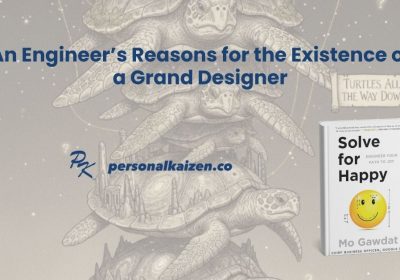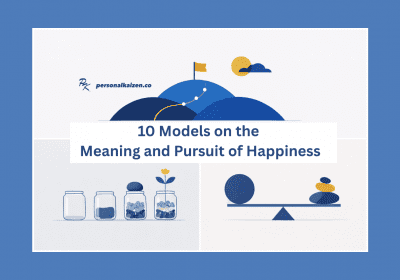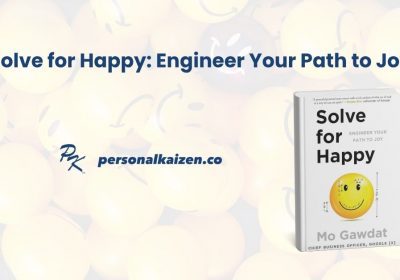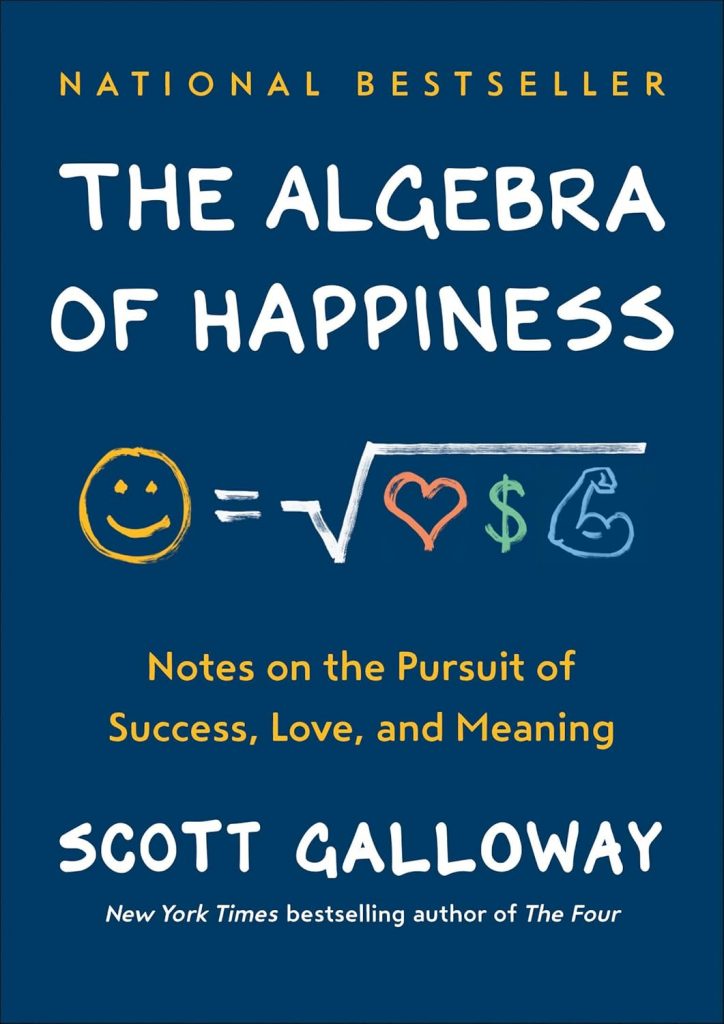
Scott Galloway’s book, The Algebra of Happiness, isn’t a traditional book of mathematical equations. Instead, it uses the concept of algebra to present “equations” or formulas for living a great life, based on Scott’s own experiences and observations. The core idea is that success, happiness, and a great life are a function of several variables, and getting these variables right requires making conscious trade-offs.
Scott Galloway is a serial entrepreneur and professor at New York University’s Stern School of Business. He has several popular podcasts, including his Prof G Pod. This post shares the key equations and concepts Scott covers in his popular business school course on the Algebra of Happiness. The remainder of the book has various thoughts on life adapted from his “No mercy / no malice” blog and newsletter.
The Algebra of Happiness
We may as well begin with the equation on the cover of the book – Scott Galloway’s equation for happiness:

According to Scott, happiness is a function of the love in your life, your financial success (defined later), and your meaning (see the definition of masculinity later). I have no idea why he makes happiness the square root of the product of Love X Success X Meaning – probably just because it looks cooler. If anybody knows the answer to this, please let me know!
Financial Equations from The Algebra of Happiness
Scott has some important thoughts on financial success, beginning with the definition of someone who is rich.
Rich = Money In > Money Out
Galloway redefines “rich” not by a high income, but by having a positive cash flow. Someone earning $50,000 but only spending $40,000 is “richer” than someone earning $1 million and spending it all.
Equity = Wealth.

It’s difficult to achieve economic security with just a salary. Scott recommends you buy property or stocks (equity that can earn you money) to become wealthy. Start investing early in your career and always diversify! Galloway personally lost everything several times in his career by not diversifying.
Serendipity = A function of courage
Good things in life—like a new job or a lasting relationship—often come from taking risks and being willing to face rejection.
Cool vacation > Cool car

Prioritize spending your money on a vacation over a new car. Experiences, such as travel, provide more long-term happiness and fulfillment than material possessions.
Money = happiness, only to a point

Once you reach a certain level of economic security, more money won’t make you much happier. Scott recommends you follow Rule 7 of our 10 Rules for Life.
Use the Compound Effect
This principle isn’t just for money. Making small, consistent investments in relationships and skills every day will lead to immense payoffs over time. For example, texting friends, taking photos, and expressing admiration to coworkers are all small investments that yield huge returns.

The Grind Years
Galloway notes that most of us have fun during our high school and college years until “shit gets real” in our mid-twenties and we finally realize we are “normal, not special” and will need to work hard in life. Eventually (probably in your fifties) we begin to realize all of the blessings of our life and become happy with the results of all of our hard work over the past 20-30 years. This is a normal progression – expect it.

Scott notes that the happiness in your 50s will be due to grinding in your “working years.” During this period, Scott recommends you prioritize work and making money.

Scott also notes:
- Balance is a myth. If you want to have a work-life balance in your twenties then you had better have rich parents. Otherwise, you will need to work hard to create wealth.
- When deciding upon a career, prioritize your natural strengths over your passions. Boring is sexy – it just needs to pay the bills!
- What do most Fortune 500 CEOs have in common? They all exercise to stay healthy.
- Your zip code and your credentials will likely determine your wealth. So, if you’re young, move to a city.

Loving Relationships are Important
Having love in your life is a key part of the algebra of happiness, and the most important decision is your partner.
Successful Partnerships are a function of passion (love) + shared values + enough money to avoid financial stress.

Do not keep score: In a relationship, constantly tallying up who does more creates contention. The goal should be to be as generous as possible. Never let your partner be hungry or cold.
Nothing is ever as good or as bad as it seems.

Life is full of ups and downs. It’s important to be resilient and not get too high on the good times or too low on the bad ones. What seems terrible in the moment won’t seem so bad later.
Happiness = Family
Happiness extends beyond having a loving partner – it includes being part of a family.
Happiness includes a partner and a family.

Galloway notes that while you don’t need children to be happy, the happiest people tend to be in monogamous relationships with kids.
Masculinity means relevance, good citizenship, and being a good father.

Scott finds masculinity (which also appears to represent meaning) hugely rewarding. To him, this is about “finding your gorilla” and being a man, not a boy. Scott notes that he can’t speak to femininity, but being a man is being proud of your relevance as a member of a family and community.
Give Someone a Good Death

When Scott’s mother was diagnosed with terminal cancer, he moved in with her for the last seven years of her life. He notes, “if you’re in a position – and many aren’t – to make a loved one’s exit more graceful, do it – you’ll cherish the experience for the rest of your life.”
How to be Successful
Galloway shares simple equations for success he has discovered through personal experience:
Success = Wealth X Passion X Family.

As discussed earlier, you need to have enough wealth (and equity) to cover your basic needs and avoid arguments about money with your partner. Passion for your partner and having a family are also key.
Success = Resilience over Failure.

Everyone will experience failure and tragedy during life. The key to success is the ability to move on.
Success = the ratio of the time you spend sweating to time spent watching others sweat.

This is a key indicator of future success. Someone who spends their time playing sports, rather than watching them, is on a path to a happier life.
Drinking lots of Alcohol will make you unhappy.

Scott points to the Harvard study on longevity finding that using alcohol predicted a man’s unhappiness more than any other factor. Galloway is a social drinker, however, due to the importance of relationships. Just try not to overdo it!
Putting it all Together
Galloway pulled most of the Algebra of Happiness equations together into a single graphic for the book:
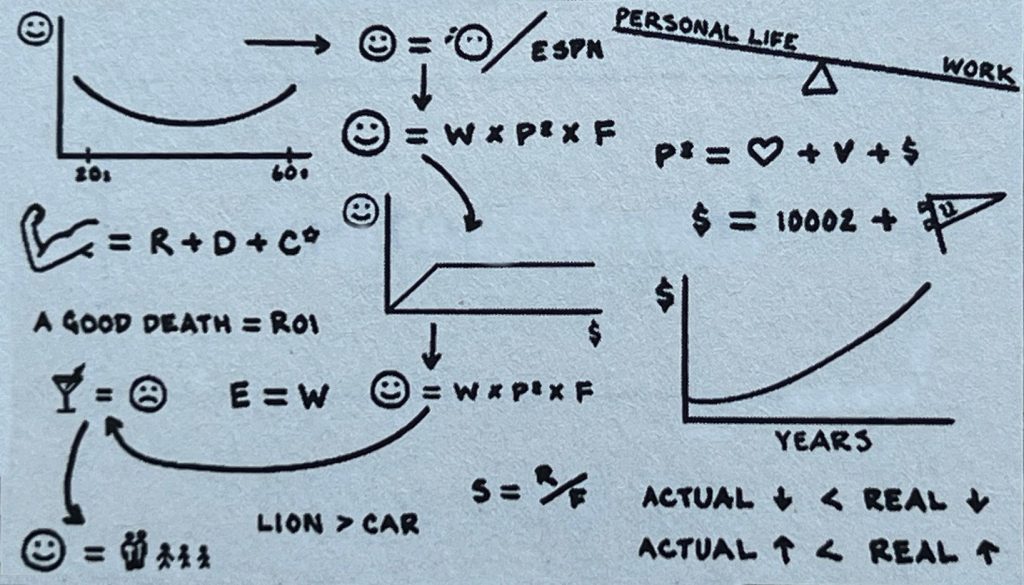
This graphic, and the others from this post, are adopted, adapted, or taken directly from the book, The Algebra of Happiness: Notes on the Pursuit of Success, Love, and Meaning by Scott Galloway. Please buy the book for the additional notes on life.

